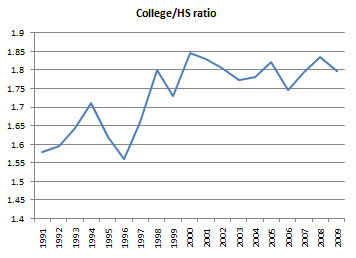Larry Mishel wrote recently about the overselling of education, pointing out that the college wage premium, after rising sharply in the 80s and 90s, has stagnated lately. Indeed. Here’s the ratio of earnings for full-time working men with college degrees versus those with high school, from the Census:So, who you gonna believe? Me, your own eyes, or Paul Krugman?
Source.
In my mind this raises several questions. One is whether emphasizing education — even aside from the fact that the big rise in inequality has taken place among the highly educated — is, in effect, fighting the last war. Another is how we have a decent society if and when even highly educated workers can’t command a middle-class income.
(Update at 9:06 pm, in italics)
In his column, Krugman expands on his blog post, and writes:
the notion that putting more kids through college can restore the middle-class society we used to have is wishful thinking. It’s no longer true that having a college degree guarantees that you’ll get a good job, and it’s becoming less true with each passing decade.Meanwhile, education gets more and more expensive; here is Mark Kleiman:
Baumol’s model, laid out in his classic “Macroeconomics of Unbalanced Growth,” is straightforward. If one part of the economy – widget-making – enjoys productivity growth, and another part – live chamber music – doesn’t, then the non-progressive sector faces a progressive cost squeeze. The price of chamber-music tickets in terms of widgets has to go up, or the pay of chamber musicians relative to widget-makers has to go down.
As long as teaching is stuck in the one-teacher-one-blackboard-thirty-students model, then education is a classic Baumol enterprise. That’s why we’re spending several times as many real dollars per pupil as we did in 1970, and getting by many standards worse results.
...
The future of education is for students to educate themselves, individually and in groups, with the help of computers, networks of computers, recorded media (including, of course, the greatest educational innovation of all, the printed book), and the skilled facilitation of a relatively small number of live helpers. ...
No, I don’t think this will be easy, or that there won’t be real losses. (A movie isn’t a perfect substitute for a stage play, and even a great CD isn’t the same as a live performance.) But there’s no option, so let’s stop complaining about the future and start inventing it.
And yes, that means universities, too. How many people, right now, are preparing to give a lecture tomorrow in introductory economics or organic chemistry? And how many of those lectures have more educational value than would a video of the best such lecture being given tomorrow? Or, better yet, a professionally-produced lecture on DVD, with hot-links to relevant materials?
... We’re going to need a new financing model for the knowledge-production part of the university’s mission. But we can’t keep operating the universities as technologically backward enterprises, just to maintain teaching jobs as an excuse for supporting scholars.
No comments:
Post a Comment